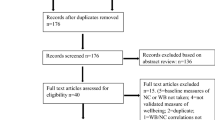Abstract
Purpose
Sleeve gastrectomy (SG) is an effective treatment for patients with severe obesity and it leads to significant weight loss and promotes the quality of life. The aim of this study was evaluating the relationship between self-efficacy, happiness and psychological well-being after sleeve gastrectomy.
Methods
One hundred patients that underwent SG were participated in this study. They were asked to fill questionnaires 12 months after surgery. To assess self-efficacy, Sherer and et al. scale, for happiness, oxford happiness scale and for psychological well-being, Ryff scale were used. Regression analysis was used on psychological well-being and happiness for evaluating the prediction of self-efficacy.
Results
The results showed that 44% of happiness and 4% of psychological well-being were determined by self-efficacy after surgery.
Conclusion
Based on these findings, self-efficacy is a significant predictor of psychological well-being and happiness.
Similar content being viewed by others
References
Mingrone G et al (2015) Bariatric–metabolic surgery versus conventional medical treatment in obese patients with type 2 diabetes: 5 year follow-up of an open-label, single-centre, randomised controlled trial. Lancet 386(9997):964–973
Jiménez-Loaisa A et al (2020) Changes in bariatric patients’ physical activity levels and health-related quality of life following a postoperative motivational physical activity intervention. Obes Surg 30:2302–2312
Major P et al (2020) Quality of life 10 years after bariatric surgery. Obes Surg. https://doi.org/10.1007/s11695-020-04726-7
Adams TD et al (2012) Health benefits of gastric bypass surgery after 6 years. JAMA 308(11):1122–1131
Linde JA et al (2006) The impact of self-efficacy on behavior change and weight change among overweight participants in a weight loss trial. Health Psychol 25(3):282
Batsis JA et al (2009) Self-efficacy after bariatric surgery for obesity. A Populat-Based Cohort Study Appetite 52(3):637–645
Robertson MC et al (2020) Self-efficacy and physical activity in overweight and obese adults participating in a worksite weight loss intervention: multistate modeling of wearable device data. Cancer Epidemiol Biomarkers Prev 29(4):769–776
Yazdani N et al (2018) Relationship between body image and psychological well-being in patients with morbid obesity. In J Commun Based Nurs Midwifery 6(2):175
Ironson G et al (2018) Positive emotional well-being, health behaviors, and inflammation measured by C-reactive protein. Soc Sci Med 197:235–243
Jyväkorpi SK et al (2018) Happiness of the oldest-old men is associated with fruit and vegetable intakes. Eur Geriatr Med 9(5):687–690
Sabatini F (2014) The relationship between happiness and health: Evidence from Italy. Soc Sci Med 114:178–187
Giuli C et al (2012) Social isolation risk factors in older hospitalized individuals. Arch Gerontol Geriatr 55(3):580–585
Sherer M et al (1982) The self-efficacy scale: construction and validation. Psychol Rep 51(2):663–671
Koskinen-Hagman, M., R. Schwarzer, and M. Jerusalem, Swedish version of the general self-efficacy scale; 1999. https://www.userpage.fu-berlin.de/health/swedish.htm.[accessed 2016-02-01][WebCite Cache ID 6ey3E7yR4], 1999.
Asgharnejad T, Ahmadi DM, Valielah F, Khodapanahi MK (2006) Psychometric properties of Sherer's general self-efficacy scale. J Psychol 10:262–274
Argyle M, Lu L (1990) The happiness of extraverts. Personal Individ Differ 11(10):1011–1017
Hills P, Argyle M (2002) The oxford happiness questionnaire: a compact scale for the measurement of psychological well-being. Personal Individ Differ 33(7):1073–1082
Alipour A, A.M, (2007) Reliability and validity of the Oxford Happiness Inventory among Iranians. J Iran Psychol 12(3):287–298
Ryff CD (1989) Happiness is everything, or is it? Explorations on the meaning of psychological well-being. J Pers Soc Psychol 57(6):1069
Ryff CD (2014) Psychological well-being revisited: advances in the science and practice of eudaimonia. Psychother Psychosom 83(1):10–28
Bayani AA, Mohammad Koochekya A, Bayani A (2008) Reliability and validity of Ryff’s psychological well-being scales. Iran J Psychiat Clin Psychol 14(2):146–151
Emdadi S et al (2017) Relationship between body image and self-efficacy in female students of Hamadan University of Medical Sciences. Dermatol Cosmetic 8(2):90–99
Acknowledgements
The authors thank the staff of the Mother and Child Hospital, who helped and assisted this research, and all the participants involved in this research study for their sincere cooperation. This study was approved by Shiraz University of Medical Sciences by no. 97-01-69-17697.
Author information
Authors and Affiliations
Corresponding author
Ethics declarations
Conflict of interest
The authors declare that they have no conflict of interest.
Ethical approval
This study was approved by the research ethics committee of University of Medical Sciences (no.IR.SUMS.REC.1398.075).
Informed consent
Informed consent was obtained from all individual participants included in the study.
Additional information
Publisher's Note
Springer Nature remains neutral with regard to jurisdictional claims in published maps and institutional affiliations.
Rights and permissions
About this article
Cite this article
Sobhani, Z., Amini, M., Hosseini, S.V. et al. Self-Efficacy, Happiness and Psychological Well-Being After Sleeve Gastrectomy. World J Surg 44, 4193–4196 (2020). https://doi.org/10.1007/s00268-020-05761-2
Accepted:
Published:
Issue Date:
DOI: https://doi.org/10.1007/s00268-020-05761-2



